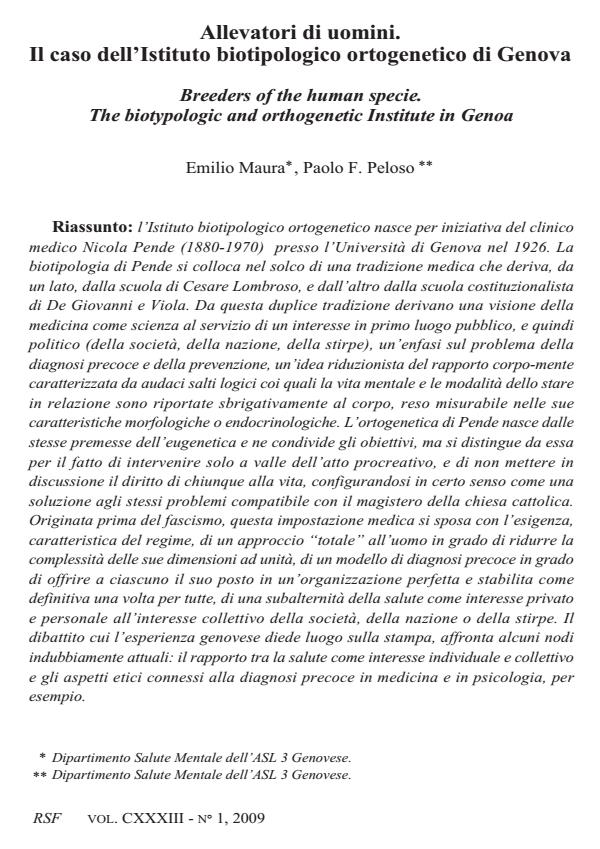Allevatori di uomini. Il caso dell’Istituto biotipologico ortogenetico di Genova
Titolo Rivista RIVISTA SPERIMENTALE DI FRENIATRIA
Autori/Curatori Emilio Maura, F. Peloso Paolo
Anno di pubblicazione 2009 Fascicolo 2009/1 Lingua Italiano
Numero pagine 17 P. 19-35 Dimensione file 492 KB
DOI 10.3280/RSF2009-001003
Il DOI è il codice a barre della proprietà intellettuale: per saperne di più
clicca qui
Qui sotto puoi vedere in anteprima la prima pagina di questo articolo.
Se questo articolo ti interessa, lo puoi acquistare (e scaricare in formato pdf) seguendo le facili indicazioni per acquistare il download credit. Acquista Download Credits per scaricare questo Articolo in formato PDF

FrancoAngeli è membro della Publishers International Linking Association, Inc (PILA)associazione indipendente e non profit per facilitare (attraverso i servizi tecnologici implementati da CrossRef.org) l’accesso degli studiosi ai contenuti digitali nelle pubblicazioni professionali e scientifiche
Allevatori di uomini. Il caso dell’Istituto biotipologico ortogenetico di Genova - The Biotypologic Orthogenetic Institute of the University of Genoa, was created, in 1926, by the Italian endocrinologist Nicola Pende (1880 -1970). Pende’s biotypology follows the Italian medical tradition, fruit of two different trains of thought: Cesare Lombroso’s medical approach and Achille De Giovanni and Giacinto Viola’s constitutionalist theory. This dual line of thought brings medical scholars to focus on public health, early diagnosis and prevention, all topics comprising a political interest in society, nation and race. Moreover, this approach involves a reductionist view of the body/mind relationship - enclosing mental and relational life in the body - and consequently allows morphological and endocrinologic measurements. Pende’s orthogenetics originates from the same premises as Eugenetics and adopts the same aims, but differs when it advocates the importance of acting after birth, so as not to infringe the tenets of the catholic church on the right of every person to live. Pende’s medical theory - outlined before the fascist era - proposes a "total" and reductive approach to the complexity of the human being, in line with the fascists’ endeavour to put each person in the right place (hence the usefulness of early diagnosis), and thus build, once and for ever, a perfect and stable social organisation. Pende’s biotypology considers public health as a priority, followed by individual health. The past debate in the media - set off by the experience of Pende’s Institute - addressed some issues discussed today : the relationship between individual and public health interests, and the bioethical features of early diagnosis in medicine and psychology. Keywords: biotypology, orthogenetics, biopolitics, constitutionalism, fascism, bioethics.;
Emilio Maura, F. Peloso Paolo, Allevatori di uomini. Il caso dell’Istituto biotipologico ortogenetico di Genova in "RIVISTA SPERIMENTALE DI FRENIATRIA" 1/2009, pp 19-35, DOI: 10.3280/RSF2009-001003